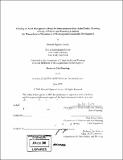Creating an asset management model for Massachusetts state-aided public housing : a study of policies and practices to inform the Massachusetts Department of Housing and Community Development
Author(s)
Creeley, Hannah Highton
DownloadFull printable version (6.505Mb)
Alternative title
Study of policies and practices to inform the Massachusetts Department of Housing and Community Development
Other Contributors
Massachusetts Institute of Technology. Dept. of Urban Studies and Planning.
Advisor
Ezra Haber Glenn.
Terms of use
Metadata
Show full item recordAbstract
Local housing authorities in the Commonwealth of Massachusetts currently manage over 50,000 state-aided public housing units on a consolidated, authority-wide level-a style of property management that does not allow for the detailed monitoring or assessment of each property within a local housing authority's portfolio. The private real estate sector and federal public housing authorities with more than 500 federal public housing units manage properties according to an asset management model in which the funding, budgeting, accounting, and management systems are conducted on a property-specific level. Recently adopted for federal public housing authorities, asset management is recognized as an effective tool for generating increased efficiency and accountability as well as improved financial and physical performance for individual properties. Some academics and professionals argue that public housing is fundamentally different from the private sector and should not adopt a private sector business practice. The differences cited include unique resident populations (one is high-need, low-income and the other is independent and financially stable) and the objectives of each sector (one is considered a public service and the other is profit-driven). This thesis investigates the models and mechanisms of two asset management models used in the public housing sector in order to best inform the Massachusetts Department of Housing and Community Development on how to move towards an asset management model for state-aided public housing. (cont.) First, strategic asset management employed by the social rented sectors of Europe and Australia is driven by four primary characteristics: market-oriented, systematic, comprehensive, and proactive. Second, the U.S. Department of Housing and Urban Development's asset management model for federal public housing authorities is technical and process-oriented with a focus on five core reform areas: property-based funding, budgeting, accounting, management, and performance assessment. Each case is informative in creating an asset management model for Massachusetts state-aided public housing that will increase efficiency and accountability, place a focus on property performance, and end the stigma and isolation of public housing.
Description
Thesis (M.C.P.)--Massachusetts Institute of Technology, Dept. of Urban Studies and Planning, 2009. Includes bibliographical references (leaves 70-73).
Date issued
2009Department
Massachusetts Institute of Technology. Department of Urban Studies and PlanningPublisher
Massachusetts Institute of Technology
Keywords
Massachusetts. Housing & Community Development., Urban Studies and Planning.